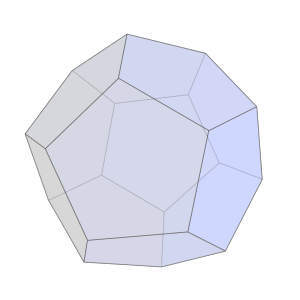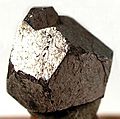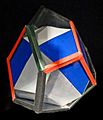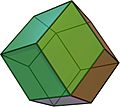Dodecahedron facts for kids
A dodecahedron is a special kind of solid shape. It has twelve flat surfaces, which are also called faces. Imagine a dice, but instead of six sides, it has twelve! Each of these twelve faces is a pentagon, which means it has five straight edges.
If you count all the corners on a dodecahedron, you'll find there are twenty of them. These corners are also known as vertices. And if you count all the lines where the faces meet, you'll find thirty edges in total. A dodecahedron that looks perfectly balanced and the same from every side is also known as a platonic solid.
Contents
What is a Dodecahedron?
A dodecahedron is a three-dimensional shape. The word "dodecahedron" comes from Greek words. "Dodeka" means twelve, and "hedra" means face or seat. So, it literally means "a shape with twelve faces."
Faces, Edges, and Vertices
- Faces: These are the flat surfaces of the shape. A dodecahedron has 12 faces, and each one is a pentagon. A pentagon is a shape with five sides and five corners.
- Edges: These are the lines where two faces meet. A dodecahedron has 30 edges.
- Vertices: These are the points where three or more edges meet. A dodecahedron has 20 vertices.
Regular Dodecahedron
The most common type of dodecahedron is called a regular dodecahedron. For a shape to be "regular," all its faces must be exactly the same size and shape. Also, the same number of faces must meet at each corner. In a regular dodecahedron, three pentagonal faces meet at every vertex.
Dodecahedra and Platonic Solids
A regular dodecahedron is one of the five special shapes known as Platonic solids. These are shapes where:
- All faces are the same regular polygon (like a square, triangle, or pentagon).
- All edges are the same length.
- The same number of faces meet at each vertex.
The five Platonic solids are:
- The tetrahedron (4 faces)
- The cube (6 faces)
- The octahedron (8 faces)
- The icosahedron (20 faces)
- The dodecahedron (12 faces)
These shapes were studied by ancient Greek mathematicians, especially Plato, which is why they are named after him. They are considered very important in geometry because of their perfect symmetry.
Where Can You Find Dodecahedra?
Dodecahedra might seem like complex shapes, but you can find them in different places:
In Nature
Some crystals can form in shapes that are similar to dodecahedra. For example, the mineral pyrite sometimes forms crystals that look like a dodecahedron.
In Games and Puzzles
You might have seen dodecahedra used as dice in role-playing games. A 12-sided die (often called a "d12") is a dodecahedron. These dice are fair because each of their twelve faces has an equal chance of landing face up.
In Art and Architecture
Artists and architects have used the dodecahedron's unique shape in their designs. Its balanced and symmetrical form makes it visually appealing.
Other Types of Dodecahedra
While the regular dodecahedron is the most famous, there are other types of shapes that also have twelve faces. For example, a rhombic dodecahedron also has twelve faces, but its faces are rhombuses (diamond shapes), not pentagons. It's still a dodecahedron because it has twelve faces, but it's not a regular one.
Images for kids
See also
 In Spanish: Dodecaedro para niños
In Spanish: Dodecaedro para niños






